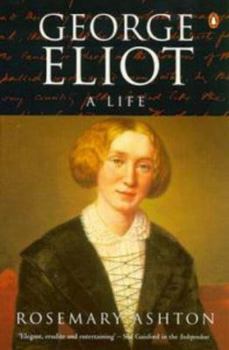George Eliot: A Life
Select Format
Select Condition 
Book Overview
This biography of Eliot sets her vividly in the political, social and religious context of the time. She arrived in London in 1851, determined to make her way as a journalist on the Westminster Review, a paper until then exclusively dominated by men. It was whilst she was working on this journal that she found her writer's voice - ironic, sceptical and broadly sympathizing.
Format:Paperback
Language:English
ISBN:0140242910
ISBN13:9780140242911
Release Date:December 1998
Publisher:Penguin Group
Length:480 Pages
Weight:0.82 lbs.
Dimensions:1.3" x 5.1" x 7.8"
Customer Reviews
2 ratings
Exemplary Biography
Published by Thriftbooks.com User , 16 years ago
Marian Evans ("George Eliot") comes alive in this biography. With one of the most brilliant analytical and creative minds of the 19th Century she overcame personal feelings of insecurity about her abilities, accomplishments, social situation and even personal appearance, to write books that were both profound, admired and successful. It helped that she had the constant encouragement of her publisher and the support she received in a decades- long relationship with George Lewes (who was legally unable to divorce his unfaithful wife.) Ashton gives a thoroughly digested chronological account of her activities, including travels and relations with family and friends, notably focusing on the writing and publication of each major work, with critical discussion of each. Some minor players in her story might have been more fully introduced but, after the initial chapter on the very early years, Ashton carried me with her all the way to the end. R. James Tobin
A good small introduction
Published by Thriftbooks.com User , 18 years ago
George Eliot is one of the central figures in the Tradition of the English Novel. In this brief introductory work Rosemary Ashton sketches the outline of her development as a novelist. She shows how Eliot's quiet revolt against the Evangelical teachings of her mentor Maria Lewis , her work as translator of Christian and philosophical texts, her making her life as ' wife in everything but the legality' of George Henry Lewes set the background for her career as novelist. Ashton then traces chronologically Eliot's career as a writer from 'Scenes of Clerical Life' to 'Daniel Deronda' by way of her great masterpiece 'Middlemarch' Ashton sees Eliot's writing as distinguished by a 'breadth of view, irony, scientific analysis and moral understanding.' Aside from the break with religion, and the importance of her childhood relation with her brother Isaac, and his later cutting her off for many years, Ashton does not go into any real analysis of Eliot's major life relationships. Most especially she does not give us the kind of detailed analysis of the relationship with Lewes which might augment our understanding of Eliot's life and work. She does however at various points give important insight into Eliot's writing. "One of George Eliot's finest gifts as a novelist is her ability to render the moral outrage and confusion of society when its rules appear to be broken by the individual. " p.13 She shows " that wide tolerance of human feelings which accompanies her clear- sighted criticism.' We judge others according to results, how else?" One of the interesting discoveries for me is how important Spinoza and Goethe were for Eliot. Eliot adheres to the Spinozean teaching "No emotion can be checked save by another emotion stronger in checking and contrary to itself, and every one refrains from inflicting evil through fear of incurring a greater evil. By this law can society be held together'. The great moral dramas in Eliot's work, the emphasis on Duty, the value given to imaginative sympathy are concretized in her greatest work 'Middlemarch' where she tells the story of two failed marriages. Ashton cites Eliot's 'most celebrated expression of the importance of imagination to moral sympathy from chapter twenty- one of 'Middlemarch' " We are all of us born in moral stupidity, taking the world as an udder to feed our supreme selves. Dorothea had early begun to emerge from that stupidity ,but yet it had been easier for her to imagine how she would devote herself to Mr. Casaubon , and become wise and strong in his strength and wisdom , than to conceive with that distinctness which is no longer reflection but feeling- an idea wrought back to the directness of sense, like the solidity of objects- that he had an equivalent centre of self, whence the lights and shadows must always fall with a certain difference'. As one who has not read a tremendous amount of Eliot I found this small introduction interesting and enjoyable.






